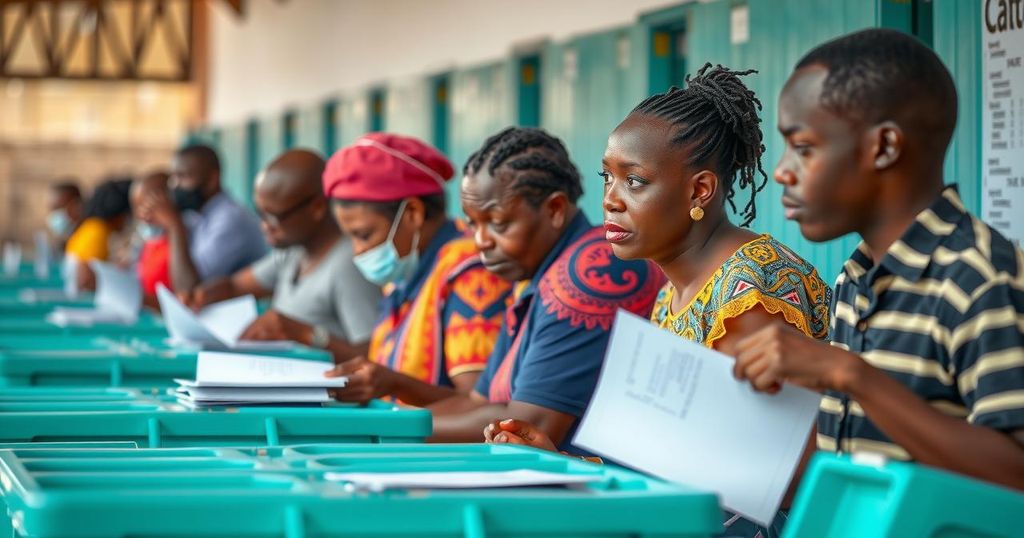Ghana’s Elections Amidst Economic Turmoil: A Test for Democracy
Polls have opened for elections in Ghana, with 18.7 million registered voters facing an economic crisis marked by high inflation and unemployment. Leading candidates Mahamudu Bawumia and John Dramani Mahama offer a continued impetus for change amidst a backdrop of growing public discontent, as the country grapples with its democratic integrity and economic challenges.
Ghana commenced its presidential and legislative elections on Saturday, which may serve as a critical indicator for democratic stability in a region grappling with extremist violence and a recent history of coups. With 18.7 million voters registered amid severe economic turmoil—characterized by rampant inflation and high unemployment—the two leading candidates, Mahamudu Bawumia from the ruling New Patriotic Party (NPP) and John Dramani Mahama from the opposition National Democratic Congress (NDC), face significant skepticism from the electorate, as many view their policies as lacking substantial differentiation.
Once celebrated as a model of democracy in West Africa, Ghana now battles a profound economic crisis that includes soaring inflation rates and an increasing scarcity of jobs. An Afrobarometer survey indicated that 82% of Ghanaians believe their country is on the wrong path. While twelve individuals have declared their presidential candidacy, the election is largely considered a two-man race, reflecting the competitive dynamics of previous elections since the reestablishment of multiparty politics in 1992.
In the lead-up to the elections, both candidates emphasized their respective political parties as solutions to the nation’s economic trials during their final campaign events. Vice President Bawumia promised to continue and fortify the economic policies of the outgoing administration, while former President Mahama reiterated his commitment to “reset” the various components of Ghanaian society, encompassing democracy, governance, and the economy.
Election sentiment has displayed an upbeat atmosphere across the capital, Accra, with vibrant campaign activities seen through visual displays and political rallies. However, a pervasive concern remains tied to the deteriorating economic situation, which has seen the country defaulting on foreign debt and grappling with skyrocketing prices for fundamental commodities, with an inflation rate that peaked at 54% last year. This economic crisis has precipitated illegal gold mining activities, driven by the growing desperation for job opportunities during an economic downturn.
Although measures have been taken to combat illegal mining, the persistent challenges it poses—such as environmental degradation—continue to be focal points in the voters’ discontent and apprehensions about the future government’s capabilities.
The article discusses the ongoing elections in Ghana, a country once celebrated for its stable democracy amidst rising disturbances in West Africa. It highlights the significant economic crisis that the nation is facing, which includes high inflation and unemployment rates, questioning the effectiveness of the leading candidates and their parties. A historical perspective is presented to illustrate Ghana’s transition from a beacon of democratic stability to a nation grappling with profound economic challenges, influencing voter sentiment and electoral prospects.
In summary, the elections in Ghana represent more than a political contest; they reflect a crucial moment for the country’s democracy and its response to a significant economic crisis. The primary candidates, amid public skepticism about their proposed solutions, are tasked with addressing deep-seated economic issues that threaten to undermine Ghana’s democratic credentials and stability. The outcome of this election could potentially reshape the future trajectory of the nation.
Original Source: www.voanews.com




Post Comment